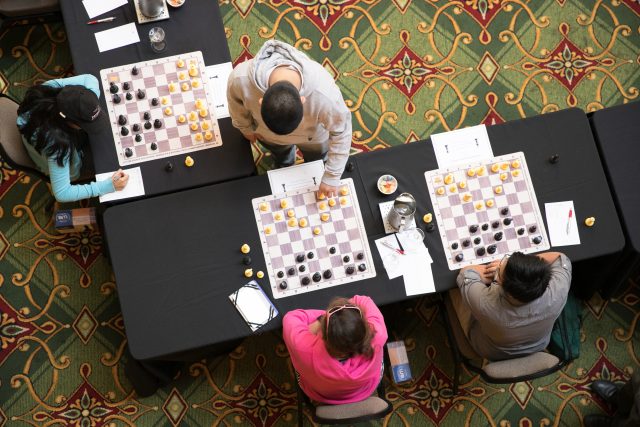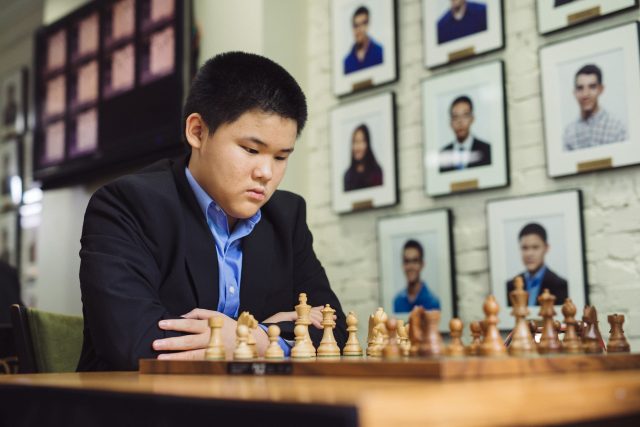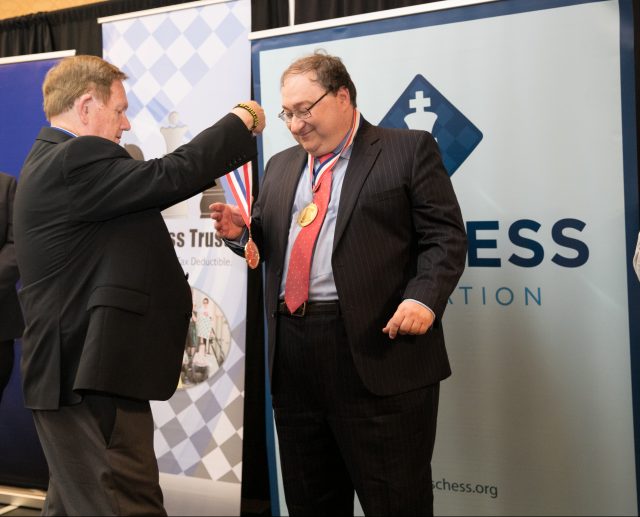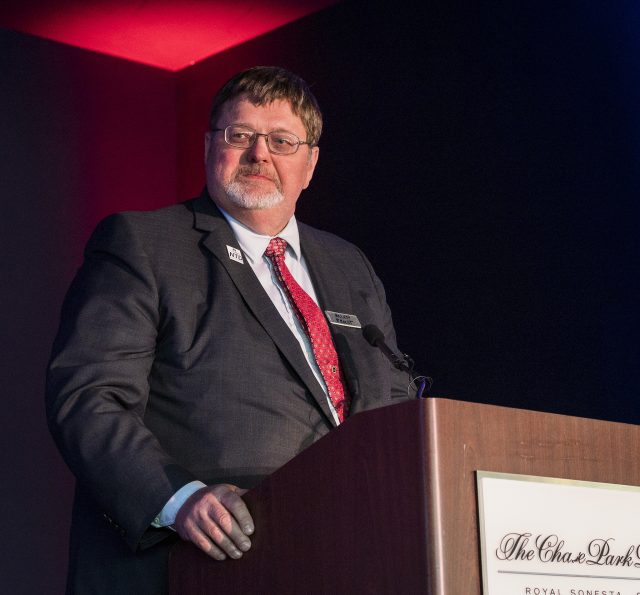As I sit at home thinking about all of the activities that took place at the 2018 US Open in Middleton, Wisconsin, I “Awonder” if it was skill or luck. Thank you to Awonder Liang for playing in the 2013 Barber Tournament of K-8 Champions as a young person. This year he became a Grandmaster, won the US Junior Championship title for the second time, and presented a simultaneous exhibition for participants in the Denker, Barber and National Girls' Tournaments. His simul was part of the opening activities of the 2018 US Open.
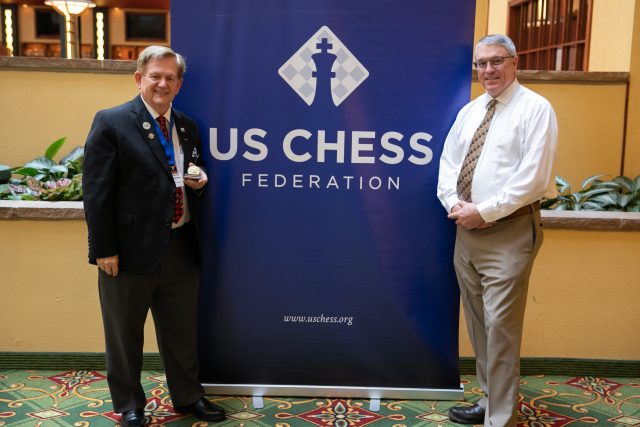 The Dean of Scholastic Chess, Dewain Barber, with US Chess Board member (president at the time), Mike Hoffpauir, Photo Henk Prinsloo
The story really began back in 1984 with a phone call that changed my life. We all will have these moments, but I could not have imagined back then all that would happen. I received a call from GM Arnold Denker, who was later to be named the Dean of American Chess. GM Denker simply said to me, “I want to do something for the kids.” At first, I thought he was going to donate his time to do a simultaneous exhibition or volunteer to pass out trophies at one of the Nationals. But as it turned out, he wanted to do a whole lot more than I expected.
He provided an idea or two suggesting an event that brought together every state high school champion. The question was how to select deserving players who would want to travel to this event. Would it be the highest rated player who qualified? Would it be based on age or something else?
As it turned out, we agreed to invite the champion from the high school tournament of each state to play. But, when? Since I was acquainted with the scholastic schedule, I knew that many of the months that might be considered would be out. Fall was the start of the school year, winter would present problems with travel, and spring was devoted to competing in state events and the Scholastic Nationals. The end result was a decision by both of us that summer would work best. But, where? There were few scholastic events available during the summer because most families were on vacation. This would mean starting a new event with no support. Arnold suggested the US Open as a possible site. He had been US Champion and had played in the US Open for many years so it seemed a possibility. The US Open was a very prestigious event with many strong players at all levels and ages wanting to compete so the fundamental question was, “Would the US Chess Federation accept a bunch of high school kids playing at their event?” Maybe yes, maybe no.
Because GM Denker was well known to the adult chess community and the Delegates, he created a motion that I co-sponsored and the delegates agreed by acclimation after he said the words, “This is good for chess.” This action created what is today known as the GM Arnold Denker Tournament of High School Champions.
This event has hosted 1,011 high school players, fourteen of which have gone on to become Grandmasters. One of those GMs was Alex Fishbein who won the first Denker event in 1985. What is unusual is that this year he played in the first National Senior Tournament of Champions in which he tied for first. In addition, Alex’s son, Mitch played in this year’s Denker! The Denker Legacy is alive and well.
Four events have followed this initial Invitational offering: GM Polgar Girls, Dewain Barber Tournament of K-8 Champions, National Girls Tournament of Champions and the National Senior Tournament of Champions. It has been quite a story over these last 34 years. I have been pleased to have been a part of this Legacy with the sponsorship of the US Chess Federation. I would also like to thank the US Chess Trust for their support.
The future is very bright for Scholastic Chess. We are all poised, youth and adult, to fulfill the mandate given to us by the Delegates of US Chess when they revised the mission of our Federation to focus on education of both youth and adults. To carry out the change in the mission mandated by the delegates, in the words of our Executive Board president, Allen Priest, “We have a legal and moral responsibility to change.” This movement of change to an educational organization for all ages started in 2008 with the delegates' mission restatement. It continued with the filing of revised Articles of Incorporation in 2009. And the IRS recognized the change by granted US Chess 501(c)3 status in 2014, retroactive to 2009.
To further support this change, all we have to do is look at what Allen saw when he visited the US Chess Championship in St. Louis this year. He stated, “This is a very American Event with merit and opportunity for American participants who represent a diversity from around the world. We are an American institution. Just visit one of our National events and you can see who we really are.”
I have no problem embracing this future. As a retired school teacher with 30 years of experience, I had the pleasure of hosting a chess club at my school. During one of those years we had been planning to attend the US Chess National Junior High Championship when I received a note from the office to see the principal. I stopped by his office and was informed the trip was off. I was shocked to learn the reason why: The US Supreme Court had ruled that all public schools could not have events that were not “curriculum-based”. I then went into the Curriculum of the California Common Core State Standards and located 14 statements that supported what chess teaches. I presented the information to the school board of my district and our chess club was designated a “curriculum-based” chess club, the first in California to be given that designation. We were then able to take our trip. Chess can be an important educational component if we demonstrate the wisdom of that direction.
In their Mission Statement one of the core values of US Chess is “Education. Chess is an educational tool aiding in the learning of planning, cause and effect relationships, pattern recognition, and research, all key skills for success in STEM (Science, Technology, Engineering, Mathematics).”
Another area of concern is the development of a strong Scholarship Program for Youth. President Priest said, “We now have in place a program that can support scholarships that are earned by scholastic players.” I look forward to working to assist with this goal. I hope that many colleges/universities continue to support scholarships for our chess youth. In addition, we need to seek out donors who clearly see that by donating to the US Chess Scholarship Program, we will be using these funds to support this goal. These funds will be separated and maintained for the future.
I would like to thank the Executive Board and Delegates of the US Chess Federation for honoring me with the title: "Dean of Scholastic Chess". I will continue to work with everyone to promote scholastic chess.
The Dean of Scholastic Chess, Dewain Barber, with US Chess Board member (president at the time), Mike Hoffpauir, Photo Henk Prinsloo
The story really began back in 1984 with a phone call that changed my life. We all will have these moments, but I could not have imagined back then all that would happen. I received a call from GM Arnold Denker, who was later to be named the Dean of American Chess. GM Denker simply said to me, “I want to do something for the kids.” At first, I thought he was going to donate his time to do a simultaneous exhibition or volunteer to pass out trophies at one of the Nationals. But as it turned out, he wanted to do a whole lot more than I expected.
He provided an idea or two suggesting an event that brought together every state high school champion. The question was how to select deserving players who would want to travel to this event. Would it be the highest rated player who qualified? Would it be based on age or something else?
As it turned out, we agreed to invite the champion from the high school tournament of each state to play. But, when? Since I was acquainted with the scholastic schedule, I knew that many of the months that might be considered would be out. Fall was the start of the school year, winter would present problems with travel, and spring was devoted to competing in state events and the Scholastic Nationals. The end result was a decision by both of us that summer would work best. But, where? There were few scholastic events available during the summer because most families were on vacation. This would mean starting a new event with no support. Arnold suggested the US Open as a possible site. He had been US Champion and had played in the US Open for many years so it seemed a possibility. The US Open was a very prestigious event with many strong players at all levels and ages wanting to compete so the fundamental question was, “Would the US Chess Federation accept a bunch of high school kids playing at their event?” Maybe yes, maybe no.
Because GM Denker was well known to the adult chess community and the Delegates, he created a motion that I co-sponsored and the delegates agreed by acclimation after he said the words, “This is good for chess.” This action created what is today known as the GM Arnold Denker Tournament of High School Champions.
This event has hosted 1,011 high school players, fourteen of which have gone on to become Grandmasters. One of those GMs was Alex Fishbein who won the first Denker event in 1985. What is unusual is that this year he played in the first National Senior Tournament of Champions in which he tied for first. In addition, Alex’s son, Mitch played in this year’s Denker! The Denker Legacy is alive and well.
Four events have followed this initial Invitational offering: GM Polgar Girls, Dewain Barber Tournament of K-8 Champions, National Girls Tournament of Champions and the National Senior Tournament of Champions. It has been quite a story over these last 34 years. I have been pleased to have been a part of this Legacy with the sponsorship of the US Chess Federation. I would also like to thank the US Chess Trust for their support.
The future is very bright for Scholastic Chess. We are all poised, youth and adult, to fulfill the mandate given to us by the Delegates of US Chess when they revised the mission of our Federation to focus on education of both youth and adults. To carry out the change in the mission mandated by the delegates, in the words of our Executive Board president, Allen Priest, “We have a legal and moral responsibility to change.” This movement of change to an educational organization for all ages started in 2008 with the delegates' mission restatement. It continued with the filing of revised Articles of Incorporation in 2009. And the IRS recognized the change by granted US Chess 501(c)3 status in 2014, retroactive to 2009.
To further support this change, all we have to do is look at what Allen saw when he visited the US Chess Championship in St. Louis this year. He stated, “This is a very American Event with merit and opportunity for American participants who represent a diversity from around the world. We are an American institution. Just visit one of our National events and you can see who we really are.”
I have no problem embracing this future. As a retired school teacher with 30 years of experience, I had the pleasure of hosting a chess club at my school. During one of those years we had been planning to attend the US Chess National Junior High Championship when I received a note from the office to see the principal. I stopped by his office and was informed the trip was off. I was shocked to learn the reason why: The US Supreme Court had ruled that all public schools could not have events that were not “curriculum-based”. I then went into the Curriculum of the California Common Core State Standards and located 14 statements that supported what chess teaches. I presented the information to the school board of my district and our chess club was designated a “curriculum-based” chess club, the first in California to be given that designation. We were then able to take our trip. Chess can be an important educational component if we demonstrate the wisdom of that direction.
In their Mission Statement one of the core values of US Chess is “Education. Chess is an educational tool aiding in the learning of planning, cause and effect relationships, pattern recognition, and research, all key skills for success in STEM (Science, Technology, Engineering, Mathematics).”
Another area of concern is the development of a strong Scholarship Program for Youth. President Priest said, “We now have in place a program that can support scholarships that are earned by scholastic players.” I look forward to working to assist with this goal. I hope that many colleges/universities continue to support scholarships for our chess youth. In addition, we need to seek out donors who clearly see that by donating to the US Chess Scholarship Program, we will be using these funds to support this goal. These funds will be separated and maintained for the future.
I would like to thank the Executive Board and Delegates of the US Chess Federation for honoring me with the title: "Dean of Scholastic Chess". I will continue to work with everyone to promote scholastic chess.
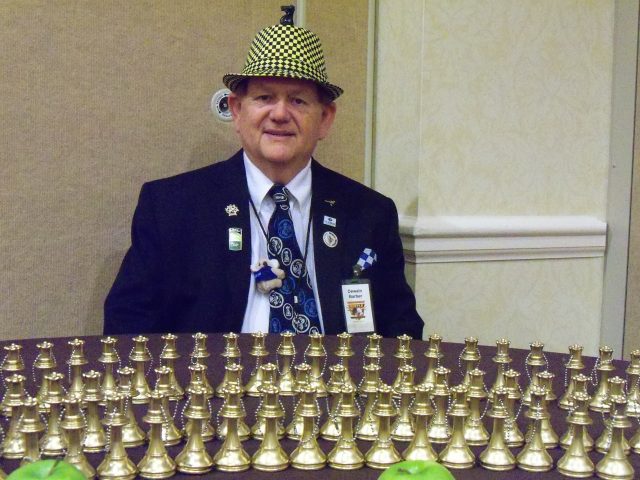 Dewain Barber is our new US Chess Dean of Scholastic Chess, and the founder of the Barber tournament of K-8 Champions. Find more his writing at barberchess.com. He is the recipient of many awards, including Recognition in 1995 for his 20 years of service to Scholastic Chess by the Southern California Chess Federation Board, 2000 Teacher of the Year, Buena Park School District, 2000 US Chess Scholastic Service Award, 2002 US Chess Special Services Award, 2008 U.S. Chess Trust Harold Dondis Award, 2010 US Chess Meritorious Service Award, 2014 City of Fullerton, CA 40 Year Achievement Award for Morrison Scholastic Chess Tournament, 2016 US Chess Distinguished Service Award for Lifetime of Dedication to Chess and 2018 US Chess GM Koltanowski Gold Medal for exceptional support to chess.
Also find Dewain Barber's article on remembering our heroes on 9/11.
Dewain Barber is our new US Chess Dean of Scholastic Chess, and the founder of the Barber tournament of K-8 Champions. Find more his writing at barberchess.com. He is the recipient of many awards, including Recognition in 1995 for his 20 years of service to Scholastic Chess by the Southern California Chess Federation Board, 2000 Teacher of the Year, Buena Park School District, 2000 US Chess Scholastic Service Award, 2002 US Chess Special Services Award, 2008 U.S. Chess Trust Harold Dondis Award, 2010 US Chess Meritorious Service Award, 2014 City of Fullerton, CA 40 Year Achievement Award for Morrison Scholastic Chess Tournament, 2016 US Chess Distinguished Service Award for Lifetime of Dedication to Chess and 2018 US Chess GM Koltanowski Gold Medal for exceptional support to chess.
Also find Dewain Barber's article on remembering our heroes on 9/11.
 The Dean of Scholastic Chess, Dewain Barber, with US Chess Board member (president at the time), Mike Hoffpauir, Photo Henk Prinsloo
The Dean of Scholastic Chess, Dewain Barber, with US Chess Board member (president at the time), Mike Hoffpauir, Photo Henk Prinsloo Dewain Barber is our new US Chess Dean of Scholastic Chess, and the founder of the Barber tournament of K-8 Champions. Find more his writing at barberchess.com. He is the recipient of many awards, including Recognition in 1995 for his 20 years of service to Scholastic Chess by the Southern California Chess Federation Board, 2000 Teacher of the Year, Buena Park School District, 2000 US Chess Scholastic Service Award, 2002 US Chess Special Services Award, 2008 U.S. Chess Trust Harold Dondis Award, 2010 US Chess Meritorious Service Award, 2014 City of Fullerton, CA 40 Year Achievement Award for Morrison Scholastic Chess Tournament, 2016 US Chess Distinguished Service Award for Lifetime of Dedication to Chess and 2018 US Chess GM Koltanowski Gold Medal for exceptional support to chess.
Also find Dewain Barber's article on remembering our heroes on 9/11.
Dewain Barber is our new US Chess Dean of Scholastic Chess, and the founder of the Barber tournament of K-8 Champions. Find more his writing at barberchess.com. He is the recipient of many awards, including Recognition in 1995 for his 20 years of service to Scholastic Chess by the Southern California Chess Federation Board, 2000 Teacher of the Year, Buena Park School District, 2000 US Chess Scholastic Service Award, 2002 US Chess Special Services Award, 2008 U.S. Chess Trust Harold Dondis Award, 2010 US Chess Meritorious Service Award, 2014 City of Fullerton, CA 40 Year Achievement Award for Morrison Scholastic Chess Tournament, 2016 US Chess Distinguished Service Award for Lifetime of Dedication to Chess and 2018 US Chess GM Koltanowski Gold Medal for exceptional support to chess.
Also find Dewain Barber's article on remembering our heroes on 9/11. Categories
Archives
- January 2026 (11)
- December 2025 (27)
- November 2025 (29)
- October 2025 (39)
- September 2025 (27)
- August 2025 (29)
- July 2025 (43)
- June 2025 (25)
- May 2025 (24)
- April 2025 (29)
- March 2025 (29)
- February 2025 (20)
- January 2025 (24)
- December 2024 (34)
- November 2024 (18)
- October 2024 (35)
- September 2024 (23)
- August 2024 (27)
- July 2024 (44)
- June 2024 (27)
- May 2024 (31)
- April 2024 (51)
- March 2024 (34)
- February 2024 (25)
- January 2024 (26)
- December 2023 (29)
- November 2023 (26)
- October 2023 (37)
- September 2023 (27)
- August 2023 (37)
- July 2023 (47)
- June 2023 (33)
- May 2023 (37)
- April 2023 (45)
- March 2023 (37)
- February 2023 (28)
- January 2023 (31)
- December 2022 (23)
- November 2022 (32)
- October 2022 (31)
- September 2022 (19)
- August 2022 (39)
- July 2022 (32)
- June 2022 (35)
- May 2022 (21)
- April 2022 (31)
- March 2022 (33)
- February 2022 (21)
- January 2022 (27)
- December 2021 (36)
- November 2021 (34)
- October 2021 (25)
- September 2021 (25)
- August 2021 (41)
- July 2021 (36)
- June 2021 (29)
- May 2021 (29)
- April 2021 (31)
- March 2021 (33)
- February 2021 (28)
- January 2021 (29)
- December 2020 (38)
- November 2020 (40)
- October 2020 (41)
- September 2020 (35)
- August 2020 (38)
- July 2020 (36)
- June 2020 (46)
- May 2020 (42)
- April 2020 (37)
- March 2020 (60)
- February 2020 (38)
- January 2020 (45)
- December 2019 (34)
- November 2019 (35)
- October 2019 (42)
- September 2019 (45)
- August 2019 (56)
- July 2019 (44)
- June 2019 (35)
- May 2019 (40)
- April 2019 (48)
- March 2019 (61)
- February 2019 (39)
- January 2019 (30)
- December 2018 (29)
- November 2018 (51)
- October 2018 (45)
- September 2018 (29)
- August 2018 (49)
- July 2018 (35)
- June 2018 (31)
- May 2018 (39)
- April 2018 (31)
- March 2018 (26)
- February 2018 (33)
- January 2018 (30)
- December 2017 (26)
- November 2017 (24)
- October 2017 (30)
- September 2017 (30)
- August 2017 (31)
- July 2017 (28)
- June 2017 (32)
- May 2017 (26)
- April 2017 (37)
- March 2017 (28)
- February 2017 (30)
- January 2017 (27)
- December 2016 (29)
- November 2016 (24)
- October 2016 (32)
- September 2016 (31)
- August 2016 (27)
- July 2016 (24)
- June 2016 (26)
- May 2016 (19)
- April 2016 (30)
- March 2016 (36)
- February 2016 (28)
- January 2016 (32)
- December 2015 (26)
- November 2015 (23)
- October 2015 (16)
- September 2015 (28)
- August 2015 (28)
- July 2015 (6)
- June 2015 (1)
- May 2015 (2)
- April 2015 (1)
- February 2015 (3)
- January 2015 (1)
- December 2014 (1)
- July 2010 (1)
- October 1991 (1)
- August 1989 (1)
- January 1988 (1)
- December 1983 (1)


